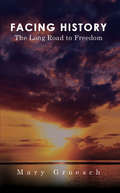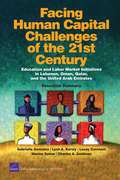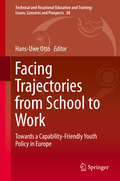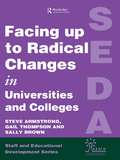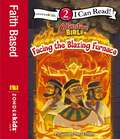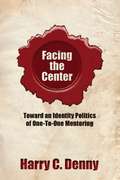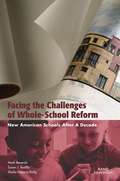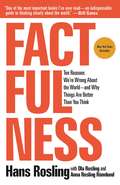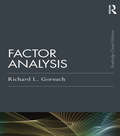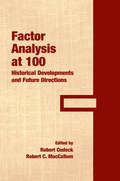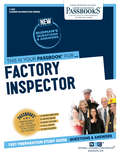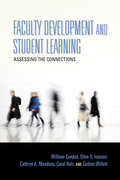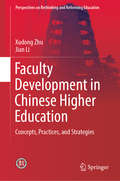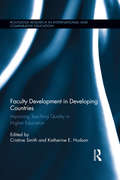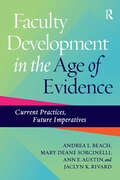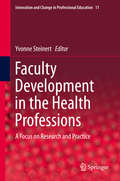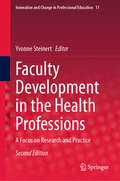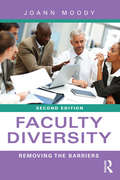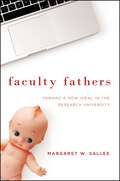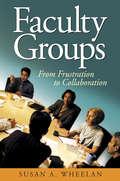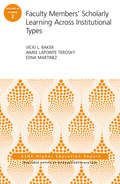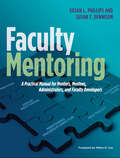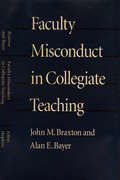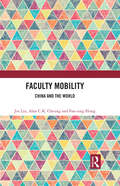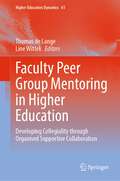- Table View
- List View
Facing History: The Long Road to Freedom
by Mary GroeschProgressive educator Mary Groesch reflects upon her thirty years of teaching through sharing Facing History: The Long Road to Freedom, one of the many curriculum units she wrote during her tenure as a teacher. The main elements of progressive practice are evidenced throughout the unit: integrated subjects, allowing students to pursue interests, to work in cooperative groups, to belong to a classroom community, to share their learning, and to have the arts as part of the larger unit of study. Readers will learn how to create progressive units of their own. Faced with more traditional expectations, readers will learn how to facilitate projects to allow their students to experience progressive practice.
Facing Human Capital Challenges of the 21st Century: Executive Summary
by Lynn A. Karoly Louay Constant Charles A. Goldman Gabriella C. Gonzalez Hanine SalemSummarizes the education and labor market initiatives implemented or under way in four countries in the Arab region--Lebanon, Oman, Qatar, and the United Arab Emirates--to address the human resource issues they each face as they prepare their countries for a place in the 21st century global economy. Together, these countries highlight the variety of challenges faced by countries in the region and responses to those challenges.
Facing Trajectories from School to Work
by Jean-Michel Bonvin Hans-Uwe Otto Roland Atzmüller Thierry Berthet Lavinia Bifulco Enrica Chiappero-Martinetti Valerie Egdell Björn Halleröd Christian Christrup Kjeldsen Marek Kwiek Regine Schröer Josiane Vero Marianna ZieleńskaThis book promotes a radical alternative impact on youth policy in Europe to overcome the situation of vulnerability and discrimination of a growing number of youngsters in their transition from school to work. It follows a Human Development perspective in using the Capability Approach (CA) as analytical and methodological guiding tool to improve the social conditions of the most socially vulnerable young people in European societies. The mission of the interdisciplinary authors is to expand the actual chances of the young to actively shape their lives in a way they have reason to choose and value. This book is based on the research of the EU Collaborative Project "Making Capabilities Work" (WorkAble), funded by the EU within the Seventh Framework Programme. It is the first empirical project to pursue a justice theory perspective on a European level. It also contributes to a fundamental change in the currently mostly insufficient attempts within the human capital approach to use the labour market to ensure desired lifestyle forms and a secure income for vulnerable youth.
Facing Up to Radical Change in Universities and Colleges (SEDA Series)
by Sally Brown Gail Thompson Steve ArmstrongThis text explores how academics face up to radical changes in the learning environment. With the implementation of new technologies to support teaching and learning there is a need for more strategic approaches to teaching and learning.
Facing the Blazing Furnace: Level 2 (I Can Read! / Adventure Bible)
by ZondervanWhen King Nebuchadnezzar orders everyone in his kingdom to worship a golden statue, three young men refuse to obey. They disobey the king and risk death in the fiery furnace.Find out what happens in this Level 2 I Can Read written and illustrated in the tradition of the bestselling NIV Adventure Bible.Perfect for beginning readers ages 4-8, learning Bible stories on their own.
Facing the Center: Toward an Identity Politics of One-to-One Mentoring
by Harry C. DennyIn the diversity of their clients as well as their professional and student staff, writing centers present a complicated set of relationships that inevitably affect the instruction they offer. In Facing the Center, Harry Denny unpacks the identity matrices that enrich teachable moments, and he explores the pedagogical dynamics and implications of identity within the writing center. The face of the writing center, be it mainstream or marginal, majority or miority, orthodox or subversive, always has implications for teaching and learning. Facing the Center will extend current research in writing center theory to bring it in touch with theories now common in cultural studies curricula. Denny takes up issues of power, agency, language, and meaning, and pushes his readers to ask how they themselves, or the centers in which they work, might be perpetuating cultures that undermine inclusive, progressive education.
Facing the Challenges of Whole-School Reform
by Susan J. Bodilly Sheila Nataraj Kirby Mark BerendsAbout a decade ago, New American Schools (NAS) set out to address theperceived lagging performance of American students and the lacklusterresults of school reform efforts. As a private nonprofit organization,NAS's mission was-and is-to help schools and districts raise studentachievement levels by using whole-school designs and design team assistanceduring implementation. Since its inception, NAS has engaged in adevelopment phase (1992-1993), a demonstration phase (1993-1995), and ascale-up phase (1995-present). Over the last ten years, RAND has been monitoring the progress of the NASinitiative. This book is a retrospective on NAS and draws together thefindings from RAND research. The book underscores the significantcontributions made by NAS to comprehensive school reform but also highlightsthe challenges of trying to reform schools through whole-school designs.Divided into sections on each research phase, the book concludes with anafterword by NAS updating its own strategy for the future. This book willinterest those who want to better understand comprehensive school reform andits effects on teaching and learning within high-stakes accountabilityenvironments.
Factfulness: Ten Reasons We're Wrong About The World--and Why Things Are Better Than You Think
by Hans Rosling Anna Rosling Rönnlund Ola Rosling<P>Factfulness: The stress-reducing habit of only carrying opinions for which you have strong supporting facts. <P>When asked simple questions about global trends—what percentage of the world’s population live in poverty; why the world’s population is increasing; how many girls finish school—we systematically get the answers wrong. So wrong that a chimpanzee choosing answers at random will consistently outguess teachers, journalists, Nobel laureates, and investment bankers. <P>In Factfulness, Professor of International Health and global TED phenomenon Hans Rosling, together with his two long-time collaborators, Anna and Ola, offers a radical new explanation of why this happens. They reveal the ten instincts that distort our perspective—from our tendency to divide the world into two camps (usually some version of us and them) to the way we consume media (where fear rules) to how we perceive progress (believing that most things are getting worse).
Factor Analysis: Classic Edition (Psychology Press & Routledge Classic Editions)
by Richard L. GorsuchComprehensive and comprehensible, this classic text covers the basic and advanced topics essential for using factor analysis as a scientific tool in psychology, education, sociology, and related areas. Emphasizing the usefulness of the techniques, it presents sufficient mathematical background for understanding and applying its use. This includes the theory as well as the empirical evaluations. The overall goal is to show readers how to use factor analysis in their substantive research by highlighting when the differences in mathematical procedures have a major impact on the substantive conclusions, when the differences are not relevant, and when factor analysis might not be the best procedure to use. Although the original version was written years ago, the book maintains its relevance today by providing readers with a thorough understanding of the basic mathematical models so they can easily apply these models to their own research. Readers are presented with a very complete picture of the "inner workings" of these methods. The new Introduction highlights the remarkably few changes that the author would make if he were writing the book today. An ideal text for courses on factor analysis or as a supplement for multivariate analysis, structural equation modeling, or advanced quantitative techniques taught in psychology, education, and other social and behavioral sciences, researchers who use these techniques also appreciate this book’s thorough review of the basic models. Prerequisites include a graduate level course on statistics and a basic understanding of algebra. Sections with an asterisk can be skipped entirely if preferred.
Factor Analysis at 100: Historical Developments and Future Directions
by Robert C. MacCallum Robert CudeckFactor analysis is one of the success stories of statistics in the social sciences. The reason for its wide appeal is that it provides a way to investigate latent variables, the fundamental traits and concepts in the study of individual differences. Because of its importance, a conference was held to mark the centennial of the publication of Charle
Factory Inspector: Passbooks Study Guide (Career Examination Series)
by National Learning CorporationThe Factory Inspector Passbook® prepares you for your test by allowing you to take practice exams in the subjects you need to study. It provides hundreds of questions and answers in the areas that will likely be covered on your upcoming exam.
Faculty Development and Student Learning
by Mary Taylor Huber Richard Haswell Ellen R. Iverson William Condon Carol Rutz Gudrun Willett Cathryn A. ManducaColleges and universities across the US have created special initiatives to promote faculty development, but to date there has been little research to determine whether such programs have an impact on students' learning. Faculty Development and Student Learning reports the results of a multi-year study undertaken by faculty at Carleton College and Washington State University to assess how students' learning is affected by faculty members' efforts to become better teachers. Extending recent research in the Scholarship of Teaching and Learning (SoTL) to assessment of faculty development and its effectiveness, the authors show that faculty participation in professional development activities positively affects classroom pedagogy, student learning, and the overall culture of teaching and learning in a college or university.
Faculty Development in Chinese Higher Education: Concepts, Practices, and Strategies (Perspectives on Rethinking and Reforming Education)
by Jian Li Xudong ZhuThis book provides a framework for investigating faculty development in the Chinese higher education system, and proposes a faculty development model, which is subsequently applied to assess the conceptual, practical and strategic dimensions of Chinese faculty development. The proposed framework is primarily based on reconstructing the higher education system. The book focuses on conceptualizing and pursuing faculty development. The intended readership includes researchers with an interest in, or whose work involves, research on faculty development and comparative higher education; administrators and stakeholders in Chinese higher education management; and graduate students majoring or minoring in comparative higher education.
Faculty Development in Developing Countries: Improving Teaching Quality in Higher Education (Routledge Research in International and Comparative Education)
by Cristine Smith Katherine HudsonLearner-centered approaches to teaching, such as small group discussions, debates, role plays and project-based assignments, help students develop critical thinking, creativity and problem-solving skills. However, more traditional lecture-based approaches still predominate in classrooms in higher education institutions around the world. Faculty development programs can support faculty members to adopt new teaching methods, even in situations where they face significant challenges due to lack of resources, on-going conflict, political upheaval, or the legacy of colonialism in their educational systems. This volume presents research and practice on faculty development for improving teaching in developing countries. Based on the concept that "we teach as we were taught," the case studies in this volume describe ways to organize professional development to help higher education faculty members shift from lecture-based to active learning teaching for students who will become the next generation of teachers, practitioners, professionals and policymakers in their respective countries.
Faculty Development in the Age of Evidence: Current Practices, Future Imperatives
by Ann E. Austin Mary Deane Sorcinelli Andrea L. Beach Jaclyn K. RivardThe first decade of the 21st century brought major challenges to higher education, all of which have implications for and impact the future of faculty professional development. This volume provides the field with an important snapshot of faculty development structures, priorities and practices in a period of change, and uses the collective wisdom of those engaged with teaching, learning, and faculty development centers and programs to identify important new directions for practice. Building on their previous study of a decade ago, published under the title of Creating the Future of Faculty Development, the authors explore questions of professional preparation and pathways, programmatic priorities, collaboration, and assessment. Since the publication of this earlier study, the pressures on faculty development have only escalated—demands for greater accountability from regional and disciplinary accreditors, fiscal constraints, increasing diversity in types of faculty appointments, and expansion of new technologies for research and teaching. Centers have been asked to address a wider range of institutional issues and priorities based on these challenges. How have they responded and what strategies should centers be considering? These are the questions this book addresses.For this new study the authors re-surveyed faculty developers on perceived priorities for the field as well as practices and services offered. They also examined more deeply than the earlier study the organization of faculty development, including characteristics of directors; operating budgets and staffing levels of centers; and patterns of collaboration, re-organization and consolidation. In doing so they elicited information on centers’ “signature programs,” and the ways that they assess the impact of their programs on teaching and learning and other key outcomes. What emerges from the findings are what the authors term a new Age of Evidence, influenced by heightened stakeholder interest in the outcomes of undergraduate education and characterized by a focus on assessing the impact of instruction on student learning, of academic programs on student success, and of faculty development in institutional mission priorities. Faculty developers are responding to institutional needs for assessment, at the same time as they are being asked to address a wider range of institutional priorities in areas such as blended and online teaching, diversity, and the scale-up of evidence-based practices. They face the need to broaden their audiences, and address the needs of part-time, non-tenure-track, and graduate student instructors as well as of pre-tenure and post-tenure faculty. They are also feeling increased pressure to demonstrate the “return on investment” of their programs.This book describes how these faculty development and institutional needs and priorities are being addressed through linkages, collaborations, and networks across institutional units; and highlights the increasing role of faculty development professionals as organizational “change agents” at the department and institutional levels, serving as experts on the needs of faculty in larger organizational discussions.
Faculty Development in the Health Professions
by Yvonne SteinertThis volume addresses all facets of faculty development, including academic and career development, teaching improvement, research capacity building, and leadership development. In addition, it describes a multitude of ways, ranging from workshops to the workplace, in which health professionals can develop their knowledge and skills. By providing an informed and scholarly overview of faculty development, and by describing original content that has not been previously published, this book helps to ensure that research and evidence inform practice, moves the scholarly agenda forward, and promotes dialogue and debate in this evolving field. It will prove an invaluable resource for faculty development program planning, implementation and evaluation, and will help to sustain faculty members' vitality and commitment to excellence. Kelley M. Skeff, M. D. , Ph. D. , May 2013: In this text, Steinert and her colleagues have provided a significant contribution to the future of faculty development. In an academic and comprehensive way, the authors have both documented past efforts in faculty development as well as provided guidance and stimuli for the future. The scholarly and well-referenced chapters provide a compendium of methods previously used while emphasizing the expanding areas deserving work. Moreover, the writers consistently elucidate the faculty development process by highlighting the theoretical underpinnings of faculty development and the research conducted. Thus, the book provides an important resource for two major groups, current providers and researchers in faculty development as well as those desiring to enter the field. Both groups of readers can benefit from a reading of the entire book or by delving into their major area of interest and passion. In so doing, they will better understand our successes and our limitations in this emerging field. Faculty development in the health professions has now received attention for 6 decades. Yet, dedicated faculty members trying to address the challenges in medical education and the health care delivery system do not have all the assistance they need to achieve their goals. This book provides a valuable resource towards that end.
Faculty Development in the Health Professions: A Focus on Research and Practice (Innovation and Change in Professional Education #11)
by Yvonne SteinertThis second edition of 'Faculty Development in the Health Professions', originally published in 2014, presents updated chapters and new topics. It also highlights changes in the evidence base for faculty development and identifies recommendations for research and practice in the field. With chapter authors coming from five continents, it builds on and presents global lessons learned for an international audience. This book describes a multitude of ways, ranging from workshops to the workplace, in which health professionals can develop their knowledge and skills as teachers and educators, leaders and managers, and researchers and scholars. By providing an informed and scholarly overview of faculty development, and by describing original content that has not been previously published, this book helps to ensure that research and evidence inform practice, move the scholarly agenda forward, and promote dialogue and debate in this evolving field. It serves as an invaluable resource for faculty development program planning, implementation and evaluation, and helps to sustain faculty members’ vitality and commitment to excellence.
Faculty Diversity: Removing the Barriers
by JoAnn MoodyWhy do we see so little progress in diversifying faculty at America’s colleges, universities, and professional schools? This book explores this important question and provides steps for hastening faculty diversity. Drawing on her extensive consultant practice and expertise as well as research and scholarship from several fields, Dr. Moody provides practical and feasible ways to improve faculty recruitment, retention, and mentorship, especially of under-represented women in science-related fields and non-immigrant minorities in all fields. The second edition of Faculty Diversity offers new insights, strategies, and caveats to the current state of faculty diversity. This revised edition includes: New strategies to prevent unintended cognitive bias and errors that damage faculty recruitment and retention Expanded discussion on the importance of different cultural contexts, political, and historical experiences inhabited and inherited by non-immigrant faculty and students Increased testimonials and on-the-ground reflections from faculty, administrators, and leaders in higher education, with new attention to medical and other professional schools Updated Appendix with Discussion Scenarios and Practice Exercises useful to search and evaluation committees, department chairs, deans, faculty senates, and diversity councils Expanded chapter on mentoring that dispels myths about informal mentoring and underlines essential components for formal programs. Moody provides an essential, reliable, and eye-opening guide for colleges, medical, and other professional schools that are frustrated in their efforts to diversify their faculty.
Faculty Fathers: Toward a New Ideal in the Research University
by Margaret W. SalleeFor the past two decades, colleges and universities have focused significant attention on helping female faculty balance work and family by implementing a series of family-friendly policies. Although most policies were targeted at men and women alike, women were intended as the primary targets and recipients. This groundbreaking book makes clear that including faculty fathers in institutional efforts is necessary for campuses to attain gender equity. Based on interviews with seventy faculty fathers at four research universities around the United States, this book explores the challenges faculty fathers—from assistant professors to endowed chairs—face in finding a work/life balance. Margaret W. Sallee shows how universities frequently punish men who want to be involved fathers and suggests that cultural change is necessary—not only to help men who wish to take a greater role with their children, but also to help women and spouses who are expected to do the same.
Faculty Groups: From Frustration to Collaboration
by Susan A. WheelanA perfect road map for teachers, this research-based book translates what social scientists have learned about work groups into practical guidelines for educators to ensure student learning.
Faculty Members' Scholarly Learning Across Institutional Types: ASHE Higher Education Report (J-B ASHE Higher Education Report Series (AEHE))
by Vicki L. Baker Aimee LaPointe Terosky Edna MartinezExplore an important, yet understudied concept: faculty scholarly learning. Taking a broad view, this volume explains how scholarly learning is defined and conceptualized by scholars. The authors synthesize the recent literature and organize the findings according to Boyer's four forms of scholarship (discovery, teaching, engagement, and integration). They then offer a counternarrative to faculty scholarly learning and the ways in which it is enacted and supported. Recommendations for developing, supporting, and evaluating faculty scholarly learning are also presented. This volume answers: What does scholarly learning look like at different types of institutions? What contexts and/or supports hinder or help faculty members' scholarly learning at the different institutional types? What challenges are noted in the extant literature on faculty work around further study or better understanding of faculty members' scholarly learning across institutional types? This is the second issue of the 43rd volume of the Jossey-Bass series ASHE Higher Education Report. Each monograph is the definitive analysis of a tough higher education issue, based on thorough research of pertinent literature and institutional experiences. Topics are identified by a national survey. Noted practitioners and scholars are then commissioned to write the reports, with experts providing critical reviews of each manuscript before publication.
Faculty Mentoring: A Practical Manual for Mentors, Mentees, Administrators, and Faculty Developers
by Susan L. Phillips Susan T. DennisonFaculty mentoring programs greatly benefit the institutions that have instituted them, and are effective in attracting and retaining good faculty.Prospective faculty members commonly ask about mentoring at on-campus interviews, and indicate that it is a consideration when choosing a position. Mentoring programs also increase the retention rate of junior faculty, greatly reducing recruitment costs, and particularly help integrate women, minority and international faculty members into the institution, while providing all new hires with an orientation to the culture, mission and identity of the college or university. The book provides step-by-step guidelines for setting up, planning, and facilitating mentoring programs for new faculty members, whether one-on-one, or using a successful group model developed and refined over twenty-five years by the authors. While it offers detailed guidance on instituting such programs at the departmental level, it also makes the case for establishing school or institutional level programs, and delineates the considerable benefits and economies of scale these can achieve. The authors provide guidance for mentors and mentees on developing group mentoring and individual mentor / protégé relationships – the corresponding chapters being available online for separate purchase; as well as detailed outlines and advice to department chairs, administrators and facilitators on how to establish and conduct institution-wide group mentoring programs, and apply or modify the material to meet their specific needs.For training and faculty development purposes, we also offer two chapters as individual e-booklets. Each respectively provides a succinct summary of the roles and expectations of the roles of Mentor and Mentee. Faculty Mentoring / Mentor GuideFaculty Mentoring / Mentee GuideThe booklets are affordably priced, and intended for individual purchase by mentors and mentees, and are only available through our Web site.
Faculty Misconduct in Collegiate Teaching
by John M. Braxton Alan E. BayerIn Faculty Misconduct in Collegiate Teaching, higher education researchers John Braxton and Alan Bayer address issues of impropriety and misconduct in the teaching role at the postsecondary level. Braxton and Bayer define and examine norms of teaching behavior: what they are, how they come to exist, and how transgressions are detected and addressed. Do faculty members across various collegiate settings, for example, share views about appropriate and inappropriate teaching behaviors, as they share expectations regarding actions related to research? And what mechanisms are utilized to correct inappropriate behavior on the part of college and university teachers?The authors' work is based on survey results obtained from faculty members at research universities, liberal arts colleges, and two-year community, junior, and technical colleges. Braxton and Bayer's focus is on undergraduate teaching in four disciplines: biology, history, mathematics, and psychology. In their analyses, the authors examine how individual, disciplinary, and institutional differences influence professorial behavior.In contrast to the more explicitly understood and enforced rules of conduct in research, the authors find that teaching norms are informally defined and observed. They argue that a formal code of ethics for undergraduate teaching would serve the dual purpose of improving undergraduate education and elevating the status of college teaching.A groundbreaking study of contemporary academe, Faculty Misconduct in Collegiate Teaching is required reading for all university and college instructors and administrators
Faculty Mobility: China and the World
by Jin Liu Alan C.K. Cheung Fan-sing HungAdopting curriculum vitae (CV) analysis method, this book collects CVs of university faculty from 109 universities of "The Double First Class University Plan" in China, and systematically analyses the mobility pattern of faculty in China for the first time. Examining the overall mobility frequency of Chinese faculty and its growing rate, the authors predict that after the epidemic, with the growing number of returned overseas talents, there may be a third wave of faculty mobility. They demonstrate that East Asia, the United States and Europe are the main channels for the inward talent mobility to China, and there are significant differences in China’s faculty mobility among different regions, disciplines and genders, which deserves further investigation. Furthermore, they argue the influencing factors of faculty mobility between China and foreign countries are highly different too. Scholars and students of Chinese higher education, international and comparative education may find this book helpful, and benefit from the analysis framework of Push and Pull Theory as long as CV analysis method.
Faculty Peer Group Mentoring in Higher Education: Developing Collegiality through Organised Supportive Collaboration (Higher Education Dynamics #61)
by Thomas De Lange Line WittekThis book addresses how peer group mentoring in higher education can contribute to the development of supportive and collaborative working environments for faculty staff. It draws on an extensive empirical study examining how group based peer-mentoring methods are implemented and experimented within four different academic communities at one university, and documents how these environments and their participants experience peer group mentoring as a collaborative measure in the development of teaching and supervision practices. The book presents a literature review of research on peer group mentoring in higher education and provides the conceptual grounding for the book, placing peer group mentoring within the field of faculty development.The work presents analyses of the enactment of peer group mentoring in different environments and of faculty peers’ engagement and collaboration with colleagues within the same teacher community, across teaching and supervision communities and across institutional boundaries. It also discusses the significance of trust in these peer group mentoring settings, summarises the implications of the reported findings and addresses the role this peer based approach might play in developing supportive collegiality in higher education as a working environment.
